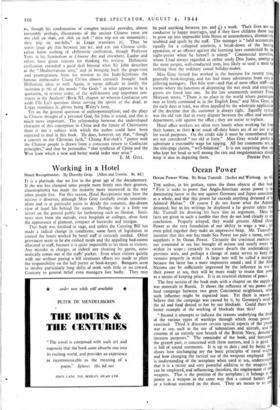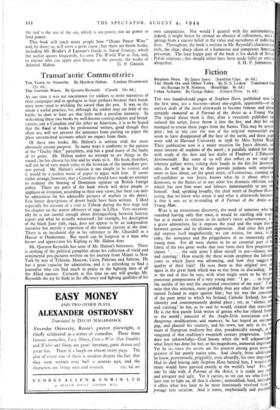Ocean Power
Ocean Power Wins. By Brian Tunstall. (Seeker and Warburg. 9s. 64
THE author, in his preface, states the three objects of this book " First it seeks to prove that Anglo-American ocean power is tin dominating factor in the war against Germany and Japan considered as a whole, and that this power far exceeds anything dreamed of by Admiral Mahan." Of course I do not know what the Admiral dreamed, but in his writings he displayed a far greater talent than Mr. Tunstall for drawing his facts into an argument. Here thr facts are given in such a jumble that they do not lead clearly to any conclusion. Properly arrayed, they would present Allied Ocean Power as the very foundation of our ability to wage a war ; and even piled together they make an impressive heap. Mr. Tunstall u insistent that this war has made Sea Power too pale a name, and he supplants it by Ocean Power. Certainly the continual exercise d our command at sea has brought all oceans and nearly every so within its scope ; certainly its stature dwarfs the undertakings d previous wars, and perhaps -a change of name serves to keep vastness properly in mind. A large tent will be called a marqu because the latter has a more impressive sound ; and if the Atli Nations can be sufficiently impressed by the influence in war their power at sea, they will be more ready to retain that pow as a means of keeping peace. It is an essential element of peace.
The first section of the book ends with a chapter on the supply war materials to Russia. It shows the influence of sea power on land campaign between two great Continental neighbouri, wh such influence might be expected least. Yet there is reason believe that the campaign was caused by it, by Germany's need the oil and food denied to her by our blockade. Could there be better example of the working of blockade than this?
" Second it attempts to indicate the reasons underlying the des of the various types of warships through which ocean power exercised. Third it discusses certain special aspects of the pr war at sea, sucfi as the use of submarines and aircraft, and creation of an entirely new branch of the British Navy, devoted invasion purposes." The remainder of the book, and fortuity the greater part, is concerned with these matters, and it is good. is full of sound statements. It is up to date ; and by being so, shows how unchanging are the basic principles of naval warfar and how changing the tactical use of the weapons employed. H is understanding of the aeroplane when used at sea, understan that it is a recent and very powerful addition. to the weapons can be employed, and influencing, therefore, the employment of weapons. That is the position of the aeroplane ; it belongs to power as a weapon in the same way that a coastal battery or a lookout stationed on the shore. They are means to an en°
the end is the use of the sea, which is sea power, not air power or land power.
This book will 'teach many people how " Ocean Power Wins " and, by doing so, will serve a great cause ; but there are better books, including Mr. Brodie's A Layman's Guide to Naval Strategy, which the author quotes frequently, his own The World War at Sea, and, to anyone who can apply past lessons to the present, the works of



























 Previous page
Previous page